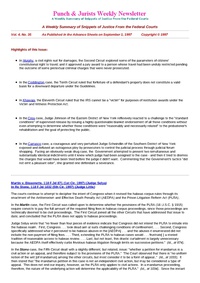Once again Judge Scheindlin has shown her mettle. In this case she courageously exposed and condemned a nasty game of judicial forum shopping by the prosecutors. After the State failed to convict the defendants on the same charges, the Government obtained an indictment against twelve defendants. Five days later …
In this case the Court rejected the defendant's contention should not have employed the arson level for homicide because the death that occurred was to a participant in the offense. The defendant argued that the use of the cross-referenced section was not perfectly analagous because the Guidelines had rejected …
Martin v. Bissonette, 118 F.3d 871 (1st Cir. 1997) (Judge Selya)
In Re Stone, 118 F.3d 1032 (5th Cir. 1997) (Judge Little)
The courts continue to attempt to decipher the intent of Congress when it revised the habeas corpus rules through its enactment of the Antiterrorism and Effective Death …
Plaintiff brought civil rights action agains various officials and court held that the cloak of judicial immunity is not peirced by allegations of bad faith or malice, even though unfairness may result.
The plaintiff in this case brought a civil rights action against various officials, including a Town …
This is a rare case in which the Court reversed and vacated a sentence due to the failure of the district court to apply U.S.S.G. § 2X1.1 in a money laundering case where the defendants failed to complete the acts necessary to launder the full amount of funds that …
The Court also held that the prevuious failure of the defendant to object to or appeal from the imposition of the special condition requiring him to attend meetings of the AAA did not constitute a waiver of his right to bring a subsequent civil action alleging the unconstitutionality of …
In this case, the Court held that the conviction of a 39-year old man under a Maine statute for the statutory rape of a girl under the age of fourteen was a "crime of violence." The crucial factors supporting the court's conclusion were (1) the age of the girl; …
Case held that the filing fee provisions of the PLRA do not apply to habeas corpus petitions prosecuted in Federal courts by state prisoners.
Martin v. Bissonette, 118 F.3d 871 (1st Cir. 1997) (Judge Selya)
In Re Stone, 118 F.3d 1032 (5th Cir. 1997) (Judge Little)
The courts …
This is one of those sweeping, petulant decisions which deals with a topic that is becoming increasingly important - namely the conditions under which the growing hordes of ex-cons are required to live while they serve their mandatory terms of supervised release. At issue here were the 13 so-called …
Case held that the IRS is not a proper "victim" under the restitution statutes for purposes of recovering the costs it incurs in a sting operation.
One of the issues raised on this appeal was whether the district court had erred in ordering the defendants to pay restitution …
In this case, the Government sought to have restitution paid to the Government for the costs that it incurred in a sting operation. The Court rejected that position, holding that the VWPA aims to protect victims, not to safeguard the government's financial interest in funds used as bait to …
This decision contains a detailed and interesting discussion about a citizen's constitutional right to travel. Here, a motorist brought a civil rights action (under 42 U.S.C. § 1983) against various police officers for damages arising from a "routine" traffic stop. During his initial arrest, the plaintiff, a black, was …
Case held that application of new statute authorizing reimposition of supervised release following termination of earlier term violated the Ex Post Facto Clause.
For contrary views see U.S. v. Page, 131 F.3d 1173 (6th Cir. 1997) and U.S. v. Brady, 88 F.3d 225 (3rd Cir. 1996).
Here the Court denied the police a defense of qualified immunity after conducting a strip search on a female who was obviously being "punished" for driving a male friend that the police found objectionable.
Back in 1993, the Tenth Circuit declared unconstitutional a jail policy in Davis County, …
This is one of those sweeping, petulant decisions which deals with a topic that is becoming increasingly important - namely the conditions under which the growing hordes of ex-cons are required to live while they serve their mandatory terms of supervised release. At issue here were the 13 so-called …
QUOTE OF THE WEEK - Must defendants automatically agree in writing to the imposition of the 13 "standard conditions" of supervised release spelled out in U.S.S.G. § 5B1.4 whether or not they are compatible with the twin goals of supervised release: rehabilitating the defendant or protecting the public?
Let's …
Martin v. Bissonette, 118 F.3d 871 (1st Cir. 1997) (Judge Selya)
In Re Stone, 118 F.3d 1032 (5th Cir. 1997) (Judge Little)
The courts continue to attempt to decipher the intent of Congress when it revised the habeas corpus rules through its enactment of the Antiterrorism and Effective Death …
Here the Court held that police officers were not entotled to qualified immunity with respect to strip searches.
The defendant in this case argued that because her personal property had been forfeited in administrative proceedings, the district court should have granted her a downward departure in her sentence pursuant to U.S.S.G. § 5K2.0. The Tenth Circuit disagreed. It noted that the Sentencing Commission had adequately considered the …
Here the Court held that time spent of plea negotiations is excludable under the Speedy Trial Act as a "proceeding involving the defendant" under § 3161(h)(1).
